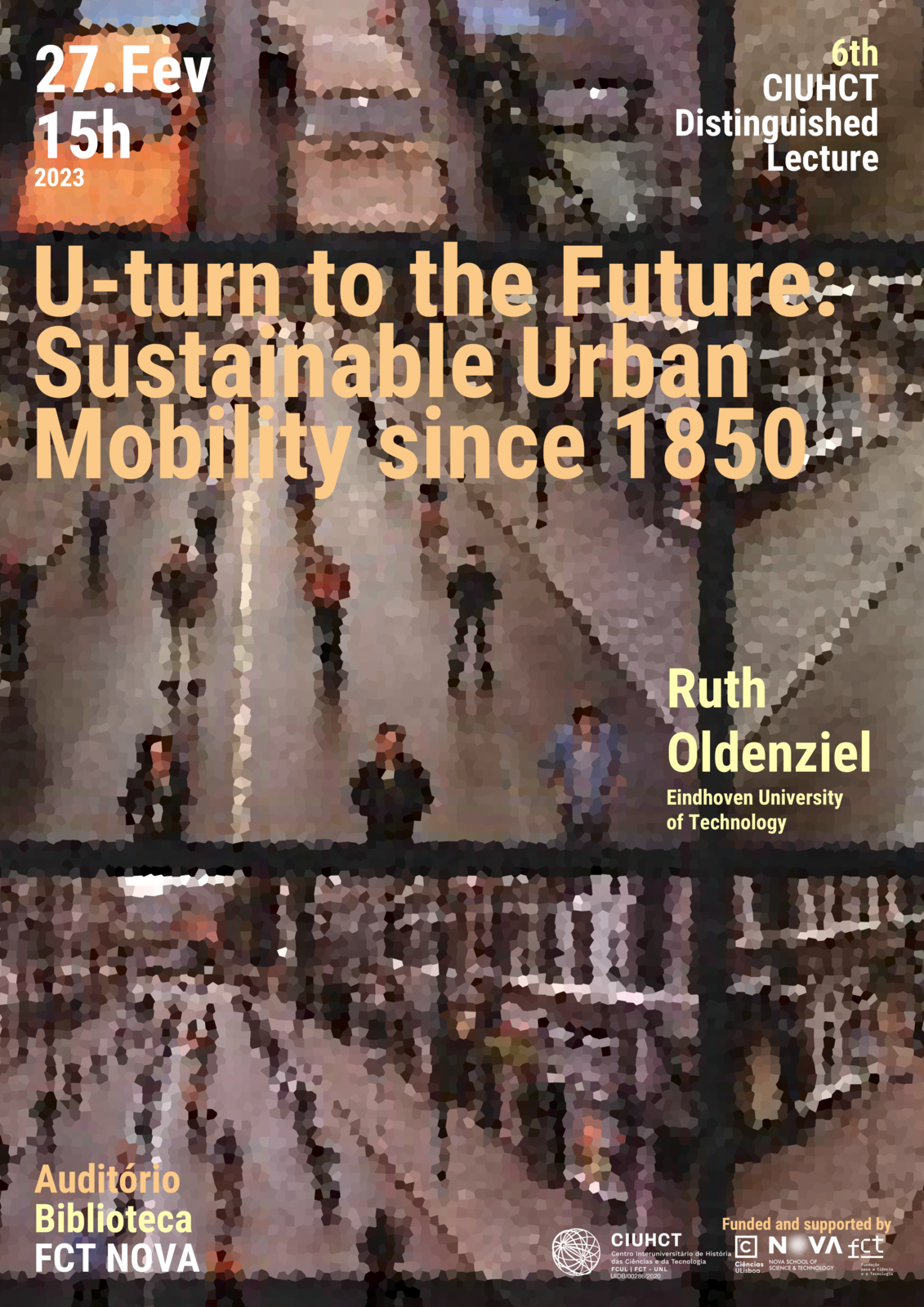6th CIUHCT Distinguished Lecture
FCT NOVA Library Auditorium
27 February 2023 · 15h00

About the speaker
 Ruth Oldenziel (PhD Yale ’92) is professor of history and innovation at Eindhoven University of Technology in The Netherlands. She is editor in chief of Technology and Culture and directs a Research-Book-Web-Teaching project Cycling Cities: The Global Experience, which will feature the case of Lisbon with M. Luísa Sousa, João Machado, Bernardo Pereira, and David Vale and an anthology on 14 African cities. Her publications include books, anthologies, and articles in American, gender, mobility, and technology studies: “The Making of the Bicycle-Oriented Development, 1960-1990." Urban History (2022) with Jan Ploeger; U-Turn to the Future (Berghahn 2020) ed. with Martin Emanuel and Frank Schipper; Cycling and Recycling ed. with Helmuth Trischler (2015); Hacking Europe ed. with Gerard Alberts (2014); Consumers, Users, Rebels (2013) authored with Mikael Hard; “Islands: The U.S. as Networked Empire” (2011); Cold War Kitchen ed. with Karin Zachmann (2009); Gender and Technology ed. with Nina Lerman and Arwen Mohun (2003); Crossing Boundaries, Building Bridges (Routledge 2000) ed. with Karin Zachmann and Annie Canel; Making Technology Masculine (1999); “Boys and Their Toys” (1997).
Ruth Oldenziel (PhD Yale ’92) is professor of history and innovation at Eindhoven University of Technology in The Netherlands. She is editor in chief of Technology and Culture and directs a Research-Book-Web-Teaching project Cycling Cities: The Global Experience, which will feature the case of Lisbon with M. Luísa Sousa, João Machado, Bernardo Pereira, and David Vale and an anthology on 14 African cities. Her publications include books, anthologies, and articles in American, gender, mobility, and technology studies: “The Making of the Bicycle-Oriented Development, 1960-1990." Urban History (2022) with Jan Ploeger; U-Turn to the Future (Berghahn 2020) ed. with Martin Emanuel and Frank Schipper; Cycling and Recycling ed. with Helmuth Trischler (2015); Hacking Europe ed. with Gerard Alberts (2014); Consumers, Users, Rebels (2013) authored with Mikael Hard; “Islands: The U.S. as Networked Empire” (2011); Cold War Kitchen ed. with Karin Zachmann (2009); Gender and Technology ed. with Nina Lerman and Arwen Mohun (2003); Crossing Boundaries, Building Bridges (Routledge 2000) ed. with Karin Zachmann and Annie Canel; Making Technology Masculine (1999); “Boys and Their Toys” (1997).
Title of the lecture
U-turns to the Future: Sustainable Urban Mobility since 1850
What do historians have to say about the future when they look at the past? Can we make a U-turn to the Future by way of the Past?
From local bike-sharing initiatives to overhauls of transport infrastructure, mobility is one of the most important areas in which modern cities are trying to realize a more sustainable future. Covid-19 has turned into a giant and global experiment about what that future could look like. Yet even as the present seems to offer a tantalizing thought experiment and as politicians and planners look ahead, critical insights remain to be gleaned from the history of urban mobility and the unsustainable practices that impact our everyday lives. Taking a leaf from the notion of the “usable past,” Oldenziel presents case studies of the book by the same title that consider the ecological, social, and economic aspects of urban mobility, showing how historical inquiry can make both conceptual and practical contributions to the projects of sustainability and urban renewal.
As Editor in Chief of Technology and Culture, she is also available for Q&A about the journal.